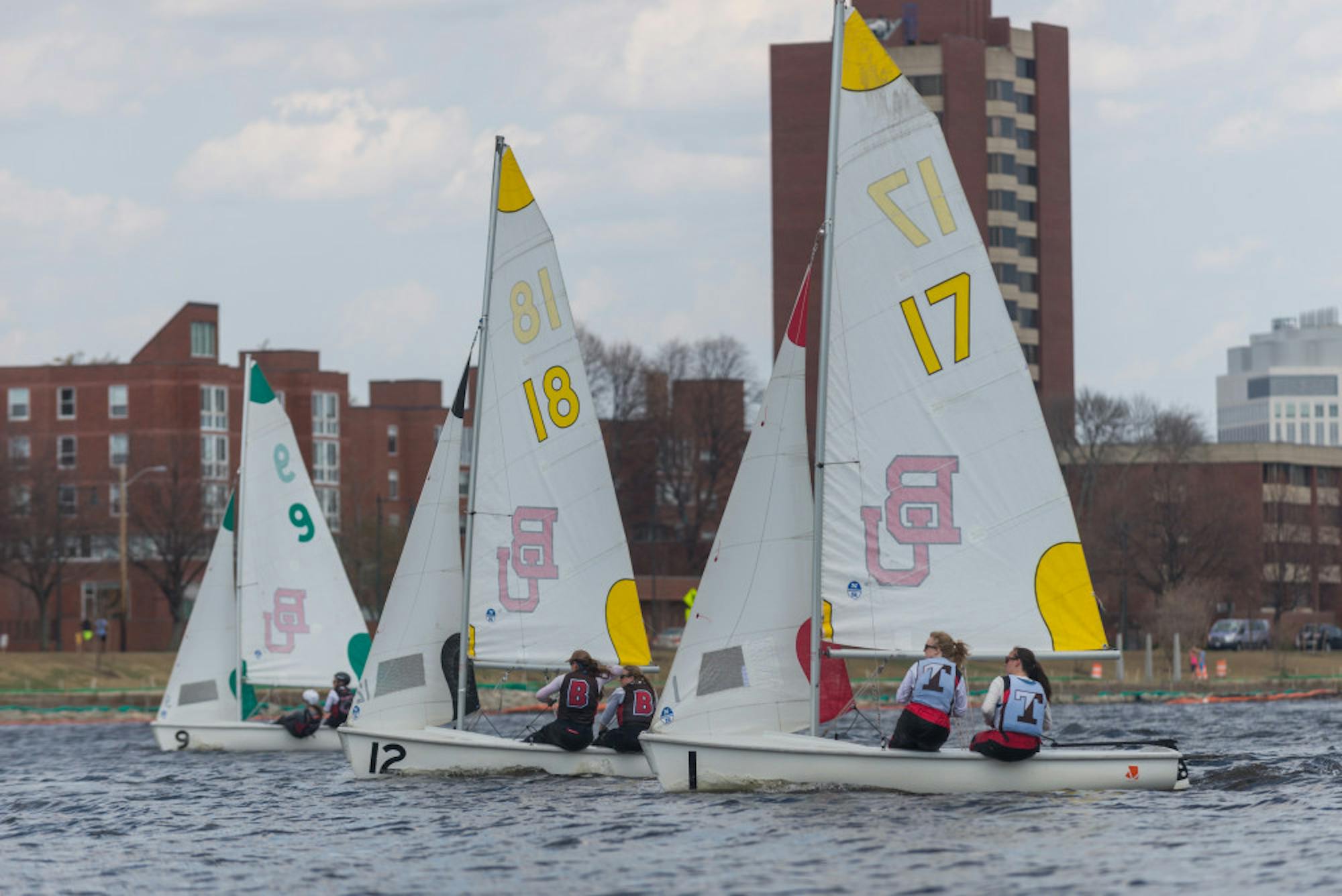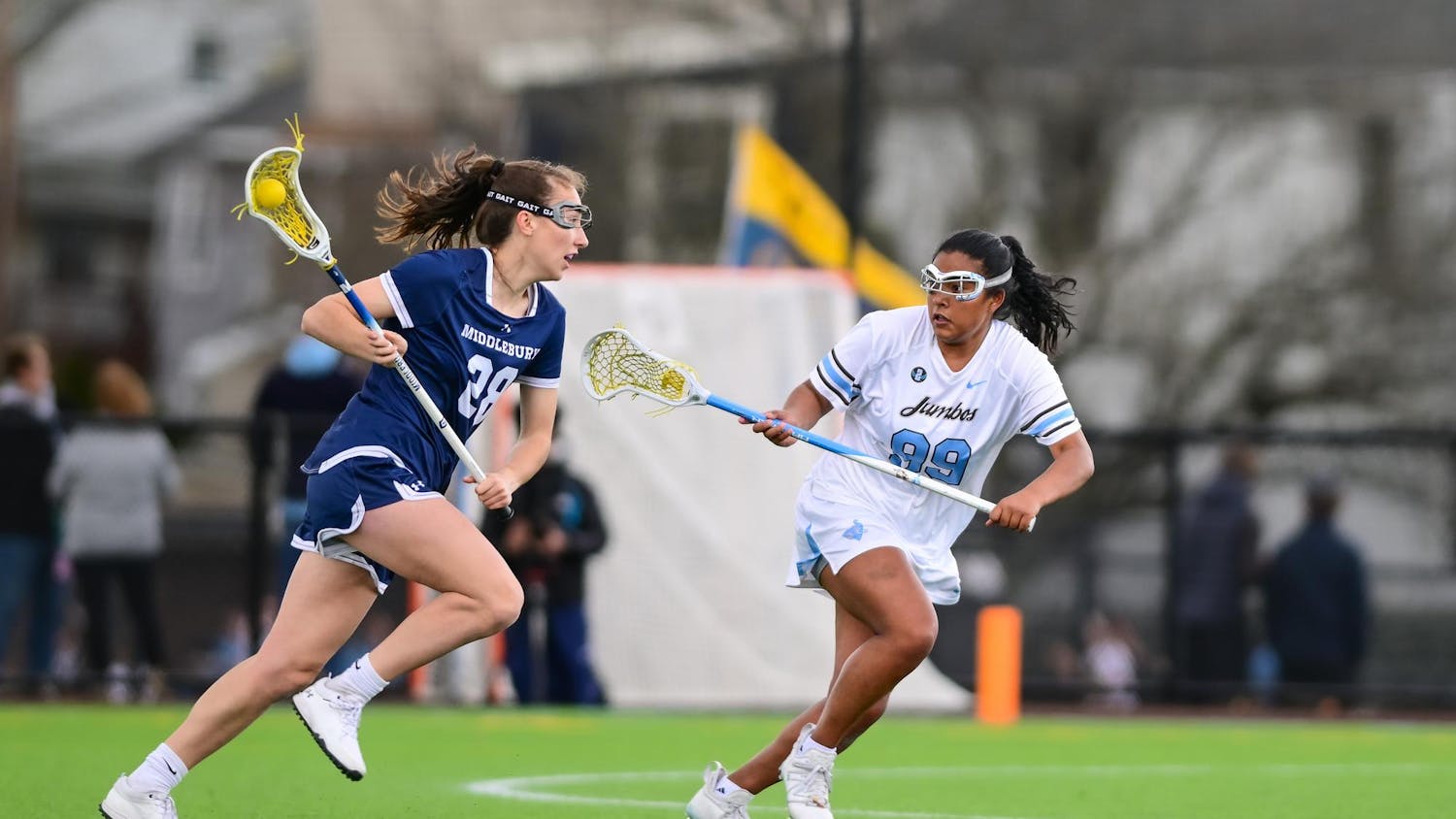In polar opposition to one’s stereotypical spring break, the Tufts co-ed and women's sailing teams headed down to Maryland, where they competed in two regattas and trained for 10 consecutive days. The teams bonded through camping in tents and braving the elements. Though their training was intensive and physically draining, the Jumbos seized on their spring break as an opportunity to grow as a team.
The week commenced on March 17 with the No. 17 co-ed team competing in the Graham Hall Team Race at the U.S. Naval Academy in Annapolis, Md. The 16 teams against which Tufts competed were particularly competitive, as many of them were Middle Atlantic Intercollegiate Sailing Association (MAISA) teams. The Tufts coed sailing team went 5–10 in the opening round and placed 11th in the regatta, losing a tie-breaker for 10th place against the U.S. Merchant Marine Academy (USMMA) and failing to advance to the final round.
Tufts defeated New York Maritime, Fordham, Cornell, Penn and Virginia. Against Virginia, Tufts shined brightest, as they finished with a 1–2–3 play combination, the strongest possible outcome. Tufts also impressed with decisive 1–2–4 victories over Penn and Cornell. In their tightest race, the Jumbos suffered a one-point loss, with their 2–3–6 play combination falling to No. 15 St. Mary’s 1–4–5.
In unchallenging conditions, junior Cam Holley skippered with junior Ian Morgan, junior skipper Jack Bitney sailed with senior Lara Dienemann and junior Florian Eenkema van Dijk skippered with senior Emily Shanley-Roberts. The friendly state of the waters allowed for the round robin of 16 to be completed with ease.
The No. 17 women’s team experienced similar conditions at the St. Mary’s Invitational on March 18, where they placed 10th out of 18 teams. The Jumbos were edged out by No. 16 Penn for ninth, but finished comfortably above No. 8 Georgetown in 11th place.
Senior skipper Molly Pleskus and junior Taylor Hart placed eighth in the A division. They were off to a slow start, but as they grew more and more familiar with the venue, they improved drastically. Following a similar trend in the B division, first-year skipper Talia Toland and senior Lucy Robison started slow but then found their rhythm, sailing to third place in one race and posting two fifth-place finishes.
Reflecting on her team’s performance at St. Mary’s, first-year Lindsay Powers mentioned that their outcomes probably would have been better had the regatta been later in the week. She added that the regatta was still great for the team because it allowed the sailors to set goals for the end of spring break.
Throughout its week of training, the Tufts women's team demonstrated its adaptability in unusual positions and intense conditions. By the end of spring break, the Jumbos were back in Boston and in excellent form as a unit. Sailing at the Bacow Sailing Pavilion on Upper Mystic Lake, the Jumbos hosted the Joseph R. Duplin Team Race on March 24–25. Tufts finished as runner-ups to No. 3 Yale. Both the Jumbos and the Bulldogs earned identical 9–4 records on the competition. The tie-breaker, determined by virtue of point total, proved disadvantageous for the Jumbos: The Bulldogs prevailed, 43–39.
“Our boat handling and our speed was better than the other teams,” Powers said. "That’s why our knowledge of the Larks was worth more on the first day. When the breeze picks up, you’re overpowered, so you’re just trying to make the boat keep going forward.”
In the opening round, Tufts sailed to victory against every competitor with the exception of South Florida, the only team from outside of New England. In the championship round, Tufts posted a 2–3 record. Yale, No. 5 Brown and No. 14 Dartmouth locked in winning combinations against the Jumbos.
“I am a [first-year], so I have never sailed the Duplin before,” Toland said. "I have always heard that one day of it is normally crazy windy, snowy, or rainy. It kind of lived up to that because we sailed in the snow and super windy conditions yesterday. A lot of boats flipped which made or broke races.”
Sailors from both teams emphasized how proud they were of the women’s team’s performance in the Duplin. The team only competes in three to four team races throughout the season, so the fact that they breezed past most of their competition was a sign of great strength for the Jumbos.
“The team is super flexible,” Powers said. “A good skipper can also see things from a crew’s perspective, and a good crew can also skipper and hold their own. You learn, and there’s value in being able to do both.”
Flexibility was the name of the game for the co-ed team this past weekend in Norfolk, Va., where the Jumbos placed eighth out of 10 teams at No. 18 Old Dominion’s Aaron Szambecki Team Race. Skippers and crews rotated in and out as the Jumbos tried to find their groove in the context of the race.
“Old Dominion is hosting Nationals, so that was our opportunity to learn that venue,” Dienemann said. “It was on the Chesapeake Bay, so it was kind of open water, but not necessarily ocean.”
It was certainly a departure from the Jumbos’ home venue, Upper Mystic Lake, and a multitude of uncontrolled variables presented obstacles which impeded their success.
“We had a pretty horrible first day at the Szambecki, winning only one race out of six,” coach Ken Legler reported to the Daily in an email. “We were fast at times but we seemed to make one or two fatal errors per race, often right at the start.”
In the opening round of racing, Tufts struggled in a major way. The Jumbos recorded eight losses and only one victory. Their lone win came against USMMA, against whom Tufts put up a convincing 1–2–4 victory. Due to their lopsided losing record, the Jumbos failed to advance to the top-four round.
In the bottom-six round, the Jumbos won three of five races. With winning play combinations, they handled Old Dominion, No. 9 Harvard and Cornell. Their 1–2–4 defeat of the Cornell Bears was, without a doubt, a highlight for the Jumbos.
“The course is called a Digital N,” Dienemann said. "The last upwind is where a lot of stuff can happen. It can really determine the race. I think we performed the best against [Cornell] on the final upwind. That’s where our strength showed during the heavy wind yesterday.”
In anticipation of the coming weeks, the co-ed team has its eyes locked on the New England Team Racing Championship — the national qualifying event — on April 7, hosted by No. 20 Conn. College. Conn. College has historically been among the most challenging venues for the Jumbos, Dienemann noted. Tufts will be challenged against its top New England Inter-Collegiate Sailing Association (NEISA) rivals in the race for Nationals qualification, but will be looking to improve before the event.
“I think we can improve on the downwind when we are winning," Dienemann said. "I think we are good at chasing when we are losing downwind, but what do you do when you are in the 1–5–6 combination and you want to make sure you keep the 1 but also help your teammates that are in last? We found ourselves in that position a lot, and we need to work on that.”
The team plans to ride its momentum from spring break into their upcoming fleet races, the first of which is the Dellenbaugh Trophy hosted by Brown on March 31. The coed team’s final rehearsal is the Marchiando Trophy at No. 19 MIT this weekend, which will be a great event to spectate.
Tufts sailing wraps up action-packed spring break

Senior skipper Molly Pleskus and junior crew Sabrina Van Mell sail in a regatta hosted by Boston University on April 15, 2017.





